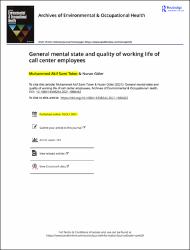| dc.contributor.author | Toker, Muhammed Akif Sami | |
| dc.contributor.author | Güler, Nuran | |
| dc.date.accessioned | 2022-05-16T13:42:32Z | |
| dc.date.available | 2022-05-16T13:42:32Z | |
| dc.date.issued | 16 Oct 2021 | tr |
| dc.identifier.citation | Toker, M. A. S., & Güler, N. (2021). General mental state and quality of working life of call center employees. Archives of Environmental & Occupational Health, 1-8. | tr |
| dc.identifier.uri | https://hdl.handle.net/20.500.12418/13140 | |
| dc.description.abstract | Working conditions of call centers lead to serious mental problems in employees as well as affecting their working life quality due to factors such as excessive workload, complex and uncertain work environment, repetitive tasks, type of tasks that ignore notions of employees, benefiting from only a part of their skills, and poor labor inspection. This study aims to determine the general mental state and quality of working life of call center employees. The sample of this descriptive study consisted of 200 employees working at Sivas ‘ALONET’ call center between December 01, 2018, and December 31, 2018. We used the Personal Information Form, General Health Questionnaire-28 (GHQ-28), and Professional Quality of Life Scale (ProQOL) as data collection tools. We collected the data from the employees through face-to-face interviews during working hours. During the analysis, we used Pearson’s Product Moments Correlation Analysis, t-test, Mann Whitney U test, Kruskal Wallis H test, and Dunnet T3 Post Hoc test. We found that the mean score of the employees in GHQ-28 was 5.34 ± 5.60, and the compassion satisfaction, burnout, and compassion fatigue subscales of the ProQOL were 36.07 ± 9.88, 14.40 ± 7.74, and 13.89 ± 9.31, respectively. While the score of the employees from the overall GHQ-28 was significantly negatively correlated with the score from the compassion satisfaction subscales of the ProQOL, we found a significantly positive correlation between the scores of burnout and compassion fatigue subscales of the ProQOL. The findings of this study revealed that approximately 45.8% of the call center employees were mentally in the at-risk group, that their compassion satisfaction level was moderate, and that their burnout and compassion fatigue levels were low. Therefore, stress factors that employees facing in their working life should be determined, and training, counseling, and support programs should be carried out to prevent them from suffering from burnout and compassion fatigue. | tr |
| dc.language.iso | eng | tr |
| dc.relation.isversionof | 10.1080/19338244.2021.1986462 | tr |
| dc.rights | info:eu-repo/semantics/embargoedAccess | tr |
| dc.subject | Call center employees, mental state, quality of working life | tr |
| dc.title | General mental state and quality of working life of call center employees | tr |
| dc.type | article | tr |
| dc.relation.journal | Archives of Environmental & Occupational Health | tr |
| dc.contributor.department | Suşehri Sağlık Yüksekokulu | tr |
| dc.contributor.authorID | 0000-0002-5679-6752 | tr |
| dc.identifier.volume | 76 | tr |
| dc.identifier.issue | 6 | tr |
| dc.identifier.endpage | 8 | tr |
| dc.identifier.startpage | 1 | tr |
| dc.relation.publicationcategory | Uluslararası Hakemli Dergide Makale - Kurum Öğretim Elemanı | tr |















